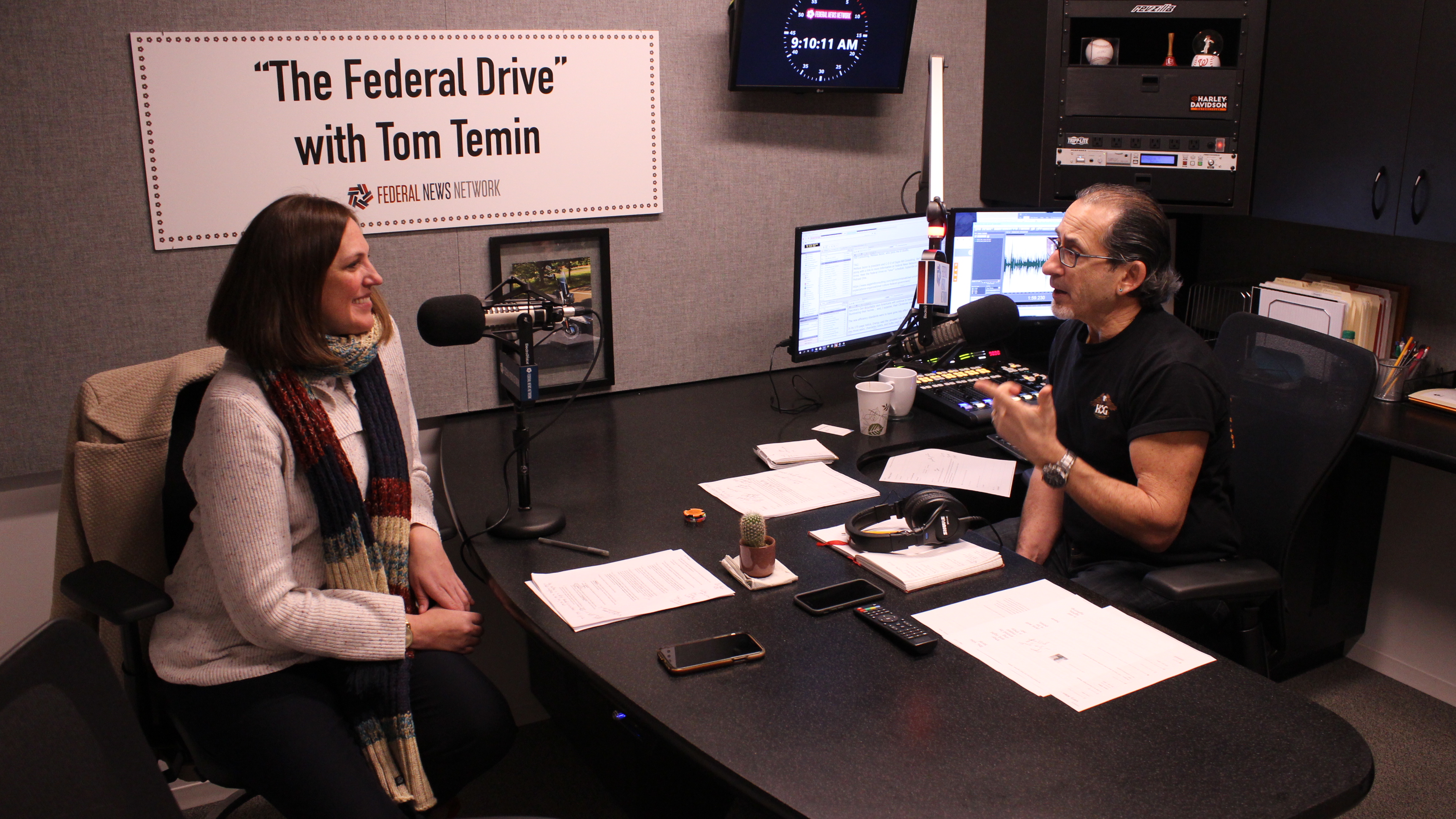How employees can get more fulfillment out of their jobs
The company HP, recently launched its first HP Work Relationship Index. It is a study that tracks and analyzes the relationship between people and their work. What...
The company HP, recently launched its first HP Work Relationship Index. It is a study that tracks and analyzes the relationship between people and their work. What it found was the relationship most employees have with their jobs is a bit on the rocks. To learn more about the study and what it could mean for future jobs, including in government, the Federal Drive with Tom Temin spoke with Todd Gustafson, the President of HP Federal.
Interview Transcript:
Todd Gustafson We at HP conducted a survey this past six months across the globe, just over 15,000 respondents. And what were you wanted to measure was try to understand the relationship that workers had at both private and public industries, what their relationship with work like, how did it matter? How did it impact their relationships at home and their productivity? And it was quite interesting. And as you might expect it buried by geography, in terms of the impact. But what we discovered is on average, about 78% of the 15,000 respondents shared that they had a very unhealthy relationship with their work. And it was certainly more concerning that we thought. We had a lot of data that drove a little bit deeper than that, but we took that and are using it as a launching pad, if you will, into how technology might be an enabler to improve that work relationship.
Eric White When you say unhealthy relationship, what does that mean? What is unhealthy relationship as it’s defined by the report, mean.
Todd Gustafson At its core it’s about two things, physical health and mental health. And so if you think about each one of those, physical health could be something as simple as not getting enough sleep because you don’t feel good about your job, you don’t feel good about the contributions you may be making. You may not necessarily align with the mission of your role so that can conduct your just your physical well-being. And then as importantly, because of that and because of the disconnect that a lot of employees have with, if we think back to pre March of 2020, the vast majority of us went to the office. We had a social outlet, we engage with our colleagues on a very regular basis in a very, if you will, work intimate relationship. All that changed, and as a result, that emotional connection that people have and the mental health that comes from that emotional connection is somewhat lacquered. And I would say that’s a little bit bifurcated based upon generational. If I think about even at HP, our adult children, they want to go to the office. That’s a social outlook for them, they want to be engaged. Where different generation all may not need that same level of engagement because they get it from their spouse or their significant other, or they decide that they don’t want to do that. So I think we meet we’ve discovered that we need to meet the employees where they’re at versus mandating what we think it should be.
Eric White You talked about how technology could help improve the relationship that most people have with work, and I imagine that’s the reason why. HP, you don’t usually think of HP as a human capital focused company, but what sorts of technologies did you all have in mind when it came to improving how people feel about their professions?
Todd Gustafson Well, let me just take a step back on that, Eric. Our founders, Bill and Dave, invented what’s called the HP Way. And the HP Way, 84 years ago was founded on giving our employees the tools and the process and the freedom to be able to engage in a way that gave them the best possible output where they could do innovation at a scale that was never thought possible before. And as an example, we were the very first company that came out with something called FTO or Flexible Time Off, where we didn’t mandate what vacations, where you took the time off as you need it, and we accommodated that. But when you think about it from a technology standpoint, I would suggest that there’s two things that are on the present. One, if you think about the emergence of virtual technology and the conversation as an example that you and I are having right now, and the fact that we can use rich media, both voice and video and do this over the airways in a way that’s very conducive to having a personal connection is really harmful. And we do that in a way that we’re dressed professionally, we’re well engaged. As an orderly, you think about what’s happening on the emergence of AI, whether it’s tools like copilot for Microsoft as an example. What individuals used to do that might be considered somewhat menial tasks, can now be accomplished with new tools that are available, that are available on the edge. You can do it on your notebook, your desktop, even your phone in a way that allows, whether you’re the government or private industry, allows you to contribute in a much greater level and let tools and technology do more of the menial tasks at work. So I think our relationship is going to change, not just in terms of who we engage with and what our leadership looks like, but also those tools and those processes that allow us to be more.
Eric White I’m glad at least the top half of me looks professional. We’re speaking with Todd Gustafson. He’s the president of HP Federal and the head of the U.S. public sector. So on the public sector side of things, what could federal agency managers take away from this report in making decisions about how to keep their workforce engaged? We have engagement scores that come out every year from the federal government. They usually stay about the same and the same agencies that have problems within the past continue to still have issues with it. What do you think they could take away from this?
Todd Gustafson The thing that I to learned the most, I’ve been with HP for 35 years, Eric, and I’ve seen it quite a lot over those years. And what I would tell you is what hasn’t changed and what is critically important from a leadership standpoint is emotional engagement. Emotional engagement with your peers, with your colleagues, with your leadership. And I’ll give you just a couple of different examples that I would offer as a suggestion, is one is that you regularly communicate your shared principles, what you’re about, what your organization about, what is your mission, how does it impact your constituents. If you work at the Department of Veterans Affairs, you think about some of our most cherished assets of our country. Folks that gave their lives to service of our country. You can absolutely align your mission with folks that you’re serving. The more that you align in those goals, as an example in the VA, is a powerful metaphor to gathering everyone together on on a singular focus. The second thing that I would say is when you think about culture of work, we’re working in this right now at HP. Every year our fiscal year begins on Nov. 1, and we’re reaffirming what we do, why we do it, and what’s the outcome of that. And we don’t assume that everyone knows that because we’re going through a transformational, we have turnover in our workforce. We have different generations, people joining, people retiring. And so that continuous information. And then I’ll just share one personal little tidbit that I do every week, every Monday morning at 9:00, I record a video every morning that is a tribute to the entire organization, which is called Top of Mind Monday. It is a five minute video on what’s top of mind for me. It gets shared broadly as from top to bottom. And it’s a really powerful way that every week I communicate with the broad organization on everything and it’s virtually unfiltered. And having that proximity engagement with the team is really important.
Eric White Could this change in the future? And I’m asking you to kind of look in the future for me. But will that mean that the top, top level of folks in charge are looking for those middle managers that are a little bit more engaging and someone like yourself who obviously has a lot of passion and is able to not just say you do this and then kind of shut off and just sink into their inbox for a while.
Todd Gustafson I think it’s important in leadership where you’re at the height, whether you’re a CEO, our secretary, or a department head or an individual contributor, that we bring the roles all the way to the ground in terms of our engagement. And I reference this is what I call sprinkles of magic. To find a way that you can reach out to someone in your organization and have a conversation with them, whether it’s individually or at a very small group where you use the two years that you are given and you listen. Listen, It’s such an amazing tool to be able to engage and give your teams the opportunity to share what they have to say. Now, that may not always change the outcomes, but I think what people what matters most to people is that they have a voice that they’re listened to, that they have an opportunity to contribute. And if if leaders can find a way to spread that, sprinkle some magic throughout their team, you’ll be a really highly amazed at what the outcomes of those are.
Copyright © 2025 Federal News Network. All rights reserved. This website is not intended for users located within the European Economic Area.
Eric White is news anchor and Federal Drive producer at Federal News Network.
Follow @FEDERALNEWSCAST






